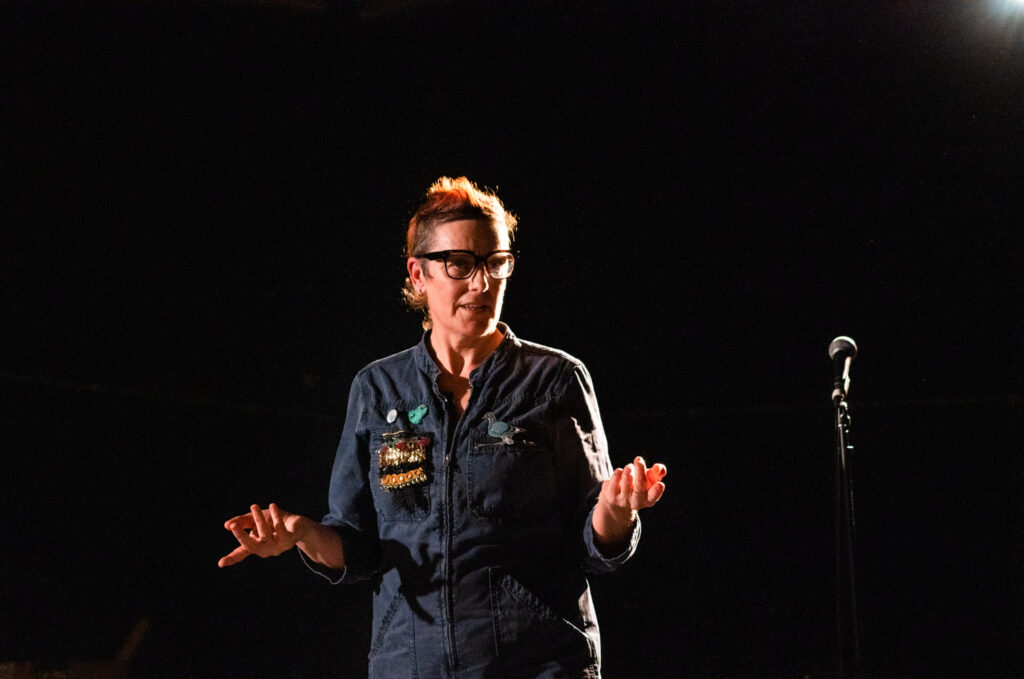Resident editor Victoria Kioi enjoys A Brief History of Difference and its exploration of identity and labels.
‘Being different is complicated business’.
Delighted to attend the opening night for this new show from Das Clarks, and Jo Fong with Becky Davies, I was first intrigued by its title. DAR, ‘a queer neurodivergent, curious, middle-aged Talking Heads fanatic’ is the main character of the performance and holds the audience’s attention as soon as they walk into the theatre room. The evening begins with an opportunity for curious minds to wander around the room, decorated with various personal memorabilia, colourful lamps, and embroidered tapestries. We are further reeled in with the ‘this could happen to you box’ full of random words that become our labels. There are different stations containing sentimental belongings and a yet unclear but recurring nod to pigeons.
A Brief History of Difference is everything you might want from an interactive play: unconventional, eccentric, and introspective.
A Brief History of Difference is about the assumptions people naturally make about us, the labels placed on us and moreso the labels we place on ourselves at different stages in our lives. How these words make us feel more important, more liked, more appreciated, more complicated, misunderstood. The audience is given time to think and talk about their particular labels and also given the option to change their label over the course of the night if they didn’t like it or aren’t comfortable with it. The performance provides multiple teaching moments at different points for members in the audience who perhaps have preconceived notions of not being able to change their ‘labels’, or who are struggling to consider the duality of humans and how change is brought by life events that affect them and alter their trajectories.
Syniadau uchelgeisiol, awdurdodol a mentrus.
Ymunwch â ni i gyfrannu at wneud Cymru gwell.
The performance begins unexpectedly with DAR instructing the audience to gather informally while they explain the sentimental objects around us. Before we sit down to watch the play, we are asked to interact with each other as an audience, a great way to start the night as it set a relaxed atmosphere, while the labels created a sense of togetherness.
DAR’s dialogue begins, coupled with upbeat music and what seems to be common identity labels placed on people in everyday life. ‘It’s a Capricorn! It’s a chatterbox! It’s clever! It’s a tomboy!’ As a common theme of the play being based around ‘difference’, identity flows through the performance as DAR bounces between thoughtful monologues, unconventional interpretive dancing that seem to reflect DAR’s own struggle with labels improperly imposed on them, and comedic interactions with the audience, keeping the performance engaging.
The audience is asked to discuss their labels amongst themselves, creating a sense of community and reassurance around the room, and adding more layers to the performance by giving us time to reflect and discuss the play.
A Brief History of Difference is everything you might want from an interactive play: unconventional, eccentric, and introspective. It’s safe to say that a lot of the audience in attendance left the theatre with much to think about the labels that placed on them in the room, those placed on them by others, those they place on others and the ones we have subconsciously placed on ourselves.
Das Clarks, Jo Fong and Becky Davies have created a performance that succeeds in getting the audience to interact with and learn things about each other, a refreshing change from the usual focus on the stage and cast. The production is intentional, well thought out, thought provoking, playing on its themes of liberation, bodies and languages, memories and labels, perceptions and assumptions, acceptance and resistance. This performance is worth watching for anyone who’s ever felt different.
All articles published on the welsh agenda are subject to IWA’s disclaimer. If you want to support our work tackling Wales’ key challenges, consider becoming a member.




